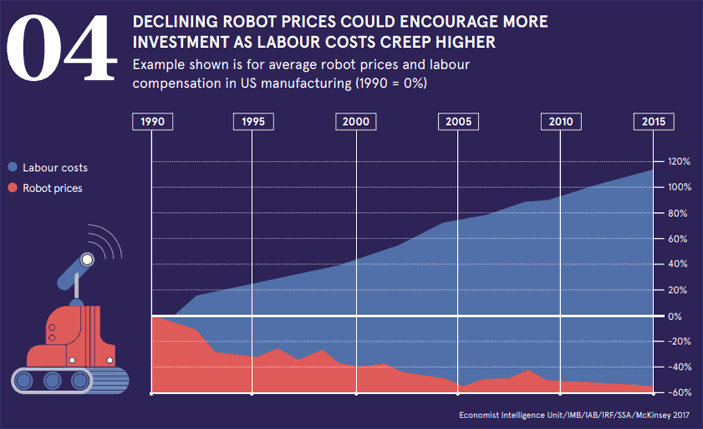What does the future hold for automation in the supply chain and the impact on jobs?
There are about as many views of that issue as there are pundits out there, with some predicting massive job losses and others saying that the robots will improve our quality of living and even increase net jobs.
Supply Chain Digest Says... |
|
|
There was a very interesting look at this subject last week on the web site of VisualCapitalist.com, which in turn was in part based on a great series of charts on automation and jobs published on the Raconteur web site.
While there is indeed much debate on the subject of robots and jobs, there are a few key areas that many experts agree on with respect to the coming age of automation:
First, half of manufacturing hours worked today are spent on manual jobs. That means they are ripe for automation. The percent of manual work in manufacturing is expecting to decline sharply by 2030.
Next, automation's impact will be felt soon.
According to a recent report from PwC, the impact on developed economy jobs will start to be felt in the mid-2020s.
By 2025, for example, it's projected that 10-15% of jobs in three sectors (manufacturing, transportation, and
wholesale/retail) will have high potential for automation.
By 2035, the range of current work with high automation potential will be closer to 35-50% for those sectors.
(See More Below)
Next, industrial robot prices are decreasing, as wage are rising, as you can see in the chart below.
In fact, the cost of robots is expected to fall by 65% between 2015 and 2025 – even as the capabilities rise rapidly due to software and AI.
Robot Costs are Dropping, while Labor Costs Keep Rising

Source: Recontuer.com
All that can't be good for jobs.
Finally, the technology will simultaneously create jobs – but no one is really sure how many.
Some say many new jobs are likely to be created in functions that are difficult for us to conceive of today. And, historically, technology really has created more jobs than it has destroyed. Will that be true again this time?
Another key question: will almost all the new jobs be created for the highly skilled and educated, as low and mid-level jobs are automated away?
No one has a crystal ball, but if looks like we are going to start to find the answers to many of these questions soon enough.
Are you optimistic or pessimistic on the impact of robots on jobs - and why? Let us know your thoughts at the Feedback section below.
Your Comments/Feedback
|